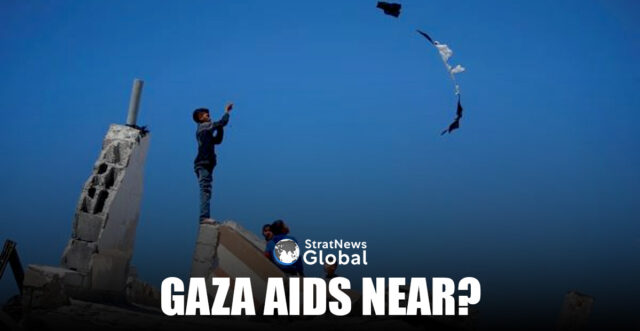The U.S. State Department said on Thursday that a plan to enable food aid deliveries to Gaza was “steps away” to being finalized, with an official announcement expected soon, even as humanitarian organizations questioned whether the proposal would truly ease the suffering of the enclave’s war-affected residents.
Anticipation has built up about a new aid plan for Gaza, laid waste by 19 months of an Israeli military campaign against Hamas that has destroyed much of its infrastructure and displaced almost all of its 2.3 million population several times.
European leaders and aid groups have criticized Israeli plans to take over distribution of humanitarian aid in Gaza and use private companies to get food to families after two months in which the military has prevented supplies entering the Strip.
Speaking at a regular briefing, State Department spokesperson Tammy Bruce gave few details about the new mechanism but referred to a “charitable foundation” that she said would be carrying out the plan.
“I was hoping to introduce it today, but the foundation will be announcing this shortly,” Bruce said.
“While we don’t have anything to announce in specifics in this regard today, and I will not speak on behalf of the foundation which will be doing the work, we welcome moves to quickly get urgent food aid into Gaza in a way … that the food aid actually gets to those to whom it’s intended.”
Hamas Seizes Food Supplies?
Israel has accused agencies including the United Nations of allowing large quantities of aid to fall into the hands of Hamas, which it accuses of seizing supplies intended for civilians and using them for its own forces.
Among the options being considered by the United States based on a document circulated among the aid community, a recently-established Gaza Humanitarian Foundation would stand up four “Secure Distribution Sites”, each built to serve 300,000 people.
Pre-packaged rations, hygiene kits and medical supplies would move through tightly-controlled corridors while being monitored in order to prevent the diversion of the assistance, according to the document.
On-site and perimeter security would be provided by experienced professionals, according to the document, to “deter interference from criminal networks or other armed groups who have historically sought to control or redirect humanitarian aid.” It added that the Israeli Defence Forces will not be stationed at or near the sites.
The aid community, which has frequently accused Israel of deliberately disregarding the complexity of aid distribution in Gaza, was skeptical.
The United Nations Office for the Coordination of Humanitarian Affairs said the Israeli-proposed authorization mechanism for the distribution of food aid “appears practically unfeasible, incompatible with humanitarian principles and will create serious insecurity risks, all while failing to meet Israel’s obligations under international law,” according to a document shared with U.N. member states.
‘Non-Starter’
A Geneva-based aid official said they were briefed by a U.S. team on a Gaza aid plan on Thursday, adding they were “not very impressed with the proposal.”
Ahmed Bayram, Norwegian Refugee Council’s media adviser for the Middle East, said the Israeli plan raised more questions than it gave answers and risked aid becoming militarized.
“What is clear is that Israel wants to take aid over… But it also sets a dangerous precedent, because probably for the first time in conflict history, or at least in recent conflict, we would have one of the parties involved in this conflict deciding where aid should go and how it should be distributed,” Bayram said.
Communities would have to move around aid hubs and the model puts civilians in danger, he said, essentially turning aid into coercion.
“The whole thing is a non-starter for us.”
A United Nations Security Council diplomat said all 15 Security Council members were present at a briefing on Wednesday by U.S. Middle East envoy Steve Witkoff on the plan to deliver aid to Gaza held at the U.S. mission to the United Nations.
“Everybody is content that the meeting took place and that someone working on the ground has (finally) briefed the rest of Council members,” the diplomat said in an email.
The diplomat said expectations remain high.
“Members (especially the E10 group) will now give the U.S. a little time to make some progress otherwise they will step in, exert pressure and bring in a new product,” the diplomat said, referring to the 10 non-permanent members of the Security Council.
(With inputs from Reuters)





